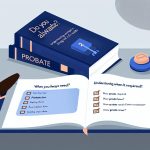Table of Contents

Key Takeaways
- UK property trusts can be a game-changer for tax efficiency and asset protection.
- Understanding the different types of trusts is crucial for effective estate planning.
- Setting up a trust can help reduce inheritance tax, potentially saving your estate thousands.
- Asset protection trusts can shield your wealth from long-term care costs.
- Regular reviews and trust compliance with UK laws are essential for maintaining benefits.
Unlocking the Secrets of UK Property Trusts
Imagine a safety net for your property investments that not only secures your wealth for future generations but also stands guard against unnecessary taxes. That’s the power of UK property trusts. These are not just for the ultra-rich; they’re accessible tools for savvy investors like you who want to make the most out of their hard-earned assets.
Let’s dive into what these trusts are and why they might just be the smart solution you’ve been looking for.
Definition and Purpose
A UK property trust is essentially a legal arrangement where you transfer ownership of your property to a set of trustees. These trustees are then responsible for managing the property on behalf of the beneficiaries you choose. Why go through this process? It’s simple:
- To keep control over who benefits from your property after you’re gone.
- To potentially save a significant amount on inheritance tax.
- To protect your assets from various risks, including long-term care costs.
Think of a property trust as a sturdy box where your real estate is kept safe and sound, with instructions you’ve left for who can open it and when.
Types of Trusts and Their Uses
There’s no one-size-fits-all when it comes to property trusts. Here’s a snapshot of the different types you might consider:
- Life Interest Trusts: Ideal for ensuring that a specific person can benefit from your property during their lifetime, with the remainder going to other beneficiaries after.
- Discretionary Trusts: These give your trustees the flexibility to make decisions about how to use the trust assets, which can be great for adapting to changing circumstances.
- Bare Trusts: Simple and straightforward, these trusts transfer assets to a beneficiary who is entitled to them once they reach 18.
Each type serves a unique purpose, and picking the right one depends on your goals. Are you looking to provide for a spouse while ensuring your children inherit your estate? A Life Interest Trust might be your ticket. Or perhaps you want to retain some flexibility? Then a Discretionary Trust could be your match.
For example, let’s say you have a rental property that you want to keep within the family. A Discretionary Trust could allow your trustees to decide the best time to distribute income or even sell the property, considering the market conditions and beneficiaries’ needs.
But remember, the success of any trust depends on the details – and that’s where your strategy needs to shine.
Types of Assets Ideal for Trusts
So, what can you actually put into a property trust? While the name might suggest it’s just for bricks and mortar, it’s broader than that. Here are some assets that are often included:
- Residential properties, whether it’s your main home or an investment property.
- Commercial real estate, offering potential income and capital growth.
- Cash or investments that may be tied to the value of a property.
It’s about making sure the right assets are in the right place at the right time. And the best part? You can tailor your trust to the assets that suit your situation.
The Trust Setup Process
Now, setting up a trust might sound complex, but it’s like building a house. You need a solid foundation, the right materials, and a good plan. Here’s how to lay the groundwork:
- Decide on the type of trust that aligns with your goals.
- Select the assets you want to include in the trust.
- Choose your trustees carefully – they’ll be the guardians of your assets.
- Create a trust deed, which is essentially the blueprint of your trust.
- Register the trust, if necessary, and transfer the assets into it.
With each step, you’re building towards a future where your property investments are secure and primed to benefit your loved ones.
Choosing Trustworthy Trustees
Choosing trustees is like picking your team. You need reliable, responsible individuals who understand your vision. Often, people choose trustworthy trustees who can effectively manage their estate.
- Family members who are beneficiaries of the trust.
- Trusted friends with a good head for decisions.
- Professional advisors, like solicitors or accountants, who bring expertise to the table.
Most importantly, talk to them. Make sure they’re willing and able to take on the role. After all, they’ll be steering the ship when you’re not around.
The Significance of the Trust Deed
The trust deed is the rulebook of your trust. It outlines what the trustees can do, sets out the beneficiaries, and spells out any conditions or powers you want to include. It’s vital to get this document right because it’s the instruction manual for your trustees and the protection for your beneficiaries.
Here’s a tip: Work with a professional to draft your trust deed. They’ll know the legal ins and outs and can ensure your wishes are crystal clear.
Maintaining Compliance and Adaptability
Setting up your trust is just the beginning. You need to keep it in good standing. That means understanding and implementing your property trust checklist to ensure you meet all legal requirements.
- Keeping accurate records of the trust’s assets and transactions.
- Making sure the trust complies with any tax obligations.
- Being ready to adapt the trust to changes in law or your circumstances.
Think of it as ongoing maintenance – it’s essential to keep everything running smoothly.
And don’t forget, changes in your life – like a new grandchild or the sale of a property – might mean your trust needs tweaking. Stay on top of these changes to ensure your trust remains fit for purpose.
For example, if you’ve set up a trust and later acquire a new rental property, you’ll need to decide whether to include it in the trust. This is where keeping your trust adaptable comes into play.
Trust Management and Oversight
Good trust management is all about oversight. You’ve handed over control to your trustees, but that doesn’t mean you wash your hands of it. Here are some key aspects of managing your trust:
- Regular communication with your trustees to ensure they understand your current wishes.
- Annual reviews of the trust’s performance and the needs of the beneficiaries.
- Ongoing monitoring to ensure the trust is being used as intended.
Imagine your trust as a garden. It needs regular tending – pruning, weeding, and sometimes a bit of re-planting – to make sure it grows in the direction you want it to.
By staying involved and informed, you can help guide your trustees and make sure your trust remains a robust safeguard for your assets.
Regular Reviews and Updates
Like any good strategy, a property trust needs to be reviewed and updated regularly. This isn’t just about checking the numbers; it’s about reflecting on changes in your life, the lives of your beneficiaries, and the law. Aim for an annual review, but also consider additional check-ins if there are significant events like marriages, births, or changes in the tax law.
Legal and Tax Advice: An Ongoing Requirement
Getting professional advice isn’t a one-off task. Tax laws change, and so do your circumstances. Building a relationship with a legal or tax advisor means you have someone who understands your trust and can provide tailored advice when you need it.
Remember, the cost of good advice is an investment in the security of your trust and the future of your beneficiaries.
And when it comes to legal and tax matters, don’t rely on hearsay or outdated information. Stay informed, stay compliant, and your trust will serve you well for years to come.
Frequently Asked Questions (FAQ)
trust. Keeping your trust deed and strategy up to date with current laws is crucial to maintaining its benefits.
There you have it – a deep dive into the world of UK property trusts. With the right approach, these trusts can be a cornerstone of your investment strategy, offering protection and peace of mind for the future.
Legal and Tax Advice: An Ongoing Requirement
Securing expert legal and tax advice isn’t just a one-time affair when dealing with UK property trusts. It’s an ongoing commitment that ensures your trust adapts to legal and fiscal shifts, preserving its integrity and efficacy. Regular consultations with professionals will help you navigate the complexities of trust management and keep you abreast of any changes that could affect your estate planning. Consider this advice as an essential investment in your financial legacy.
Frequently Asked Questions (FAQ)
Can Trusts Fully Protect My Assets from Every Creditor?
Trusts are strong, but they’re not impenetrable. They can protect against many claims, but not all. For instance, if you owe money to creditors, they might still be able to reach assets within certain types of trusts.
How Did Brexit Affect UK Property Trusts?
For the most part, Brexit hasn’t turned the world of UK property trusts upside down. The fundamentals remain the same, but it’s always wise to check for any specific changes that could affect your trust.
What Types of Properties Should Be Placed in a Trust?
Any property that you want to protect and eventually pass on could be a candidate for a trust. This includes your family home, investment properties, and even land. Think about what you want to achieve with each asset, and use that to guide your decision.
Under What Circumstances Can Trust Assets be Taxed?
Trusts can offer tax advantages, but they’re not completely tax-free. For example, if a trust generates income, there might be income tax to pay. And depending on the value of the trust’s assets, there could be inheritance tax considerations too.
Do I Need to Update My Trust if Tax Laws Change?
Absolutely. Tax laws can have a significant impact on your trust. Keeping your trust deed and strategy up to date with current laws is crucial to maintaining its benefits.
- Can You Do Probate Yourself in the UK? Pros, Cons and Common Mistakes – 15 February 2026
- Probate Without a Will: What Happens When Someone Dies Intestate? – 12 February 2026
- The True Cost of Probate in the UK – Fees, Taxes and Hidden Expenses – 9 February 2026






